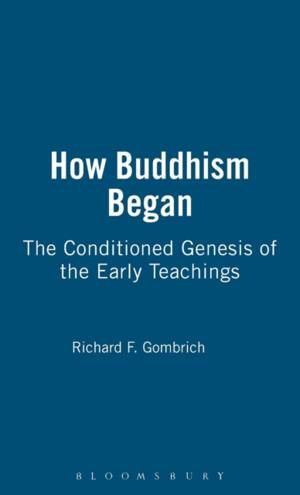
- Afhalen na 1 uur in een winkel met voorraad
- Gratis thuislevering in België vanaf € 30
- Ruim aanbod met 7 miljoen producten
- Afhalen na 1 uur in een winkel met voorraad
- Gratis thuislevering in België vanaf € 30
- Ruim aanbod met 7 miljoen producten
Zoeken
€ 223,95
+ 447 punten
Uitvoering
Omschrijving
This book takes a fresh look at the earliest Buddhism texts and offers various suggestions how the teachings in them had developed. Two themes predominate. Firstly, it argues that we cannot understand the Buddha unless we understand that he was debating with other religious teachers, notably brahmins. For example, he denied the existence of a 'soul'; but what exactly was he denying? Another chapter suggests that the canonical story of the Buddha's encounter with a brigand who wore a garland of his victims' fingers probably reflects an encounter with a form of ecstatic religion. The other main theme concerns metaphor, allegory and literalism. By taking the words of the texts literally - despite the Buddha's warning not to - successive generations of his disciples created distinctions and developed doctrines far beyond his original intention. One chapter shows how this led to a scholastic categorisation of meditation. Failure to understand a basic metaphor also gave rise to the later argument between the Mahayana and the older tradition. Perhaps most important of all, a combination of literalism with ignorance of the Buddha's allusions to brahminism led buddhists to forget that the Buddha had preached that love, like christian charity, could itself be directly salvific.
Specificaties
Betrokkenen
- Auteur(s):
- Uitgeverij:
Inhoud
- Aantal bladzijden:
- 194
- Taal:
- Engels
- Reeks:
- Reeksnummer:
- nr. 17
Eigenschappen
- Productcode (EAN):
- 9780485174175
- Verschijningsdatum:
- 1/01/1996
- Uitvoering:
- Hardcover
- Formaat:
- Genaaid
- Afmetingen:
- 138 mm x 222 mm
- Gewicht:
- 371 g

Alleen bij Standaard Boekhandel
+ 447 punten op je klantenkaart van Standaard Boekhandel
Beoordelingen
We publiceren alleen reviews die voldoen aan de voorwaarden voor reviews. Bekijk onze voorwaarden voor reviews.











